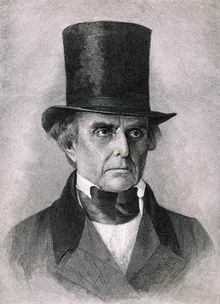
DANIEL WEBSTER.
THIS was not the man who wrote the spelling-book and the large dictionary. That was Noah Webster, one of our most learned men and greatest writers. But Daniel Webster was a lawyer, a senator, and a great statesman,—perhaps the greatest statesman that ever lived in the United States. It is now about thirty years since he died, at the age of seventy.
You do not care much about great men? Well, but they were all boys once, and then they had no more idea of becoming great men than you have now. This Daniel was a boy once, and a poor boy too. He was born in a log house, within sight of Mount Washington, New Hampshire. His good mother taught him to read when he was so little that, as you would say, he "could not remember it;" and when he was four or five years old, he trudged off to school with his spelling-book and his dinner basket half a mile to a log school-house.
When he became old enough to work, he went to school only in the winter, just as many another poor boy has done. But he was no dunce; he learned his lessons quickly, and learned them well, too, and then spent the rest of his time at work or at play. He was very fond of rambling about in the fields and woods, and as he was of delicate frame, that strengthened his constitution, and probably saved his life. Daniel loved his books. As soon as he was old enough to help his father in the sawmill, he would set the saw, and then read in some book of history or biography while the saw ran through the log. While yet a small boy, he one day saw at the store, a cotton pocket handkerchief with the Constitution of the United States printed on it. This was the first copy he had seen, and he was so eager to get it that he paid for it twenty-five cents, all the money he had, and he spent the whole evening intent upon its study.
His brother Ezekiel and he often had disputes about things that they had learned, and one night after they had gone to bed, they became so much excited in debate that they got up to look at their books to find out which was right. Unfortunately, however, they set the bedding on fire, and came near burning up the house. Daniel, on being questioned afterward about the cause of the accident, said that they were in pursuit of light, but they got more than they wanted. When Daniel learned that his father, with all his poverty, had determined to send him to college, "a strange thrill" ran over him, and he leaned his head on his father's shoulder, and burst into tears. But he improved his time well; and when he had graduated, he taught school to get money enough to send his brother through college, and while yet studying law, he gave his first earnings to pay off his father's debts.
When you are old enough to "like such things," I hope you will read his life, to learn what a great man he became, what eloquent speeches he made in defense of the noble Constitution of his-country, (which, he first read on the cotton pocket handkerchief), and how all the people honored him, turning out in crowds to greet him, calling him the '"Defender of the Constitution." And if you learn, too, that toward the last he clouded his great fame by intemperance, take timely warning. If he had fallen into this vice in youth, he never would have gained renown.
Mr. Webster was a farmer, and took great delight in country things,—in trees, in loads of hay, in noble Indian corn, in fine sheep and cattle.
When at the height of his fame, he still spent much time on his model farm at Marshfield, Massachusetts, which he took great pains to make both beautiful and productive. Here he died; and it is related that only three days before his death he had his great oxen driven up to the door, that he might smell their healthy breath, and take his last look of those broad generous faces that were never false to him. On returning from Washington at one time, after a perplexing session of Congress, he said to a friend: "I am satisfied that a farmer's is the most rational mode of existence. Good food, home-raised, with healthful work for the day and sound sleep for the night, give a man a clear head, a large heart, and strong hands."
Although, toward the latter part of his life, Mr. Webster made some sad mistakes, still he was in the main a noble man, and we may learn many good lessons from his life.
Aunt Julia.